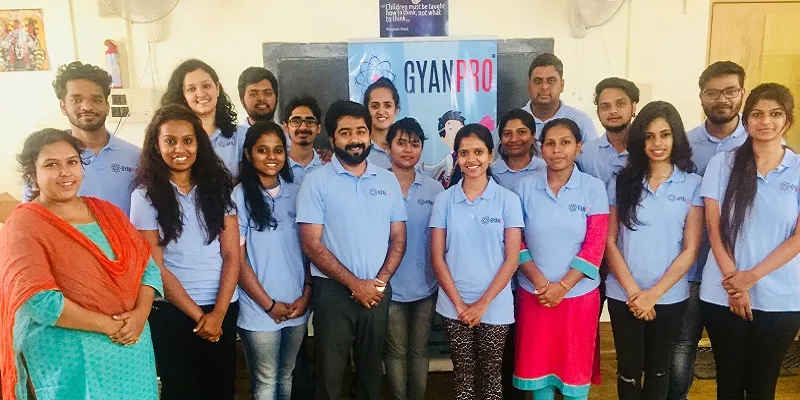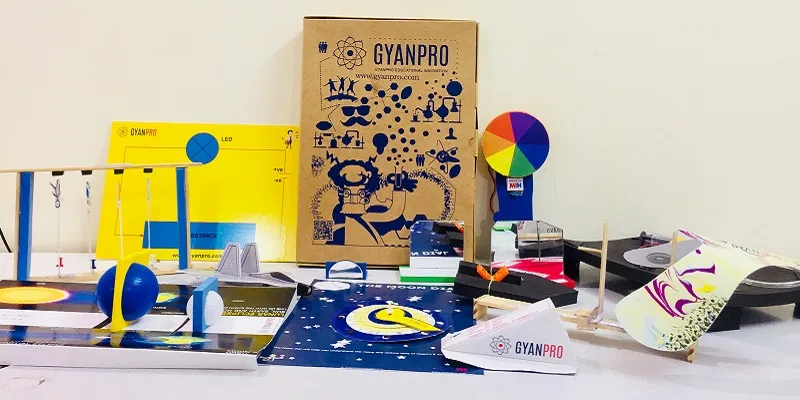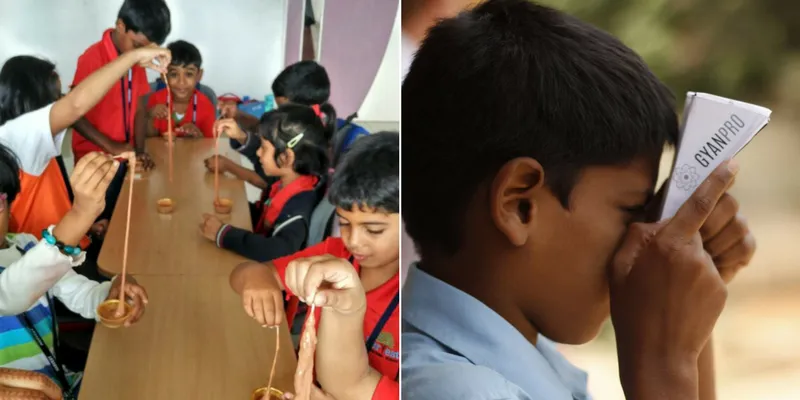Storytelling, puzzles, and games: how GyanPro makes science easy and interactive for students
This Bengaluru-based edtech startup aims to foster curiosity, creativity, and imagination for science in young minds.

Picture this. A group of students take up the roles of atoms or molecules to study a chemical reaction or understand the complex concepts of light and sound; a card game for a periodic table or a monopoly game with trivia on planets; a spectroscope to learn about light or a wireless electricity activity to learn about the future of power transmission… Ever wondered how such enquiry-based teaching models can help children satiate their interest in science?
In an age where teaching methodologies have progressed from chalk and talk to PPTs to digital boards with animations, Bengaluru-based GyanPro is innovating to help both students and teachers through their unique learning aids.
Rekindling inquisitiveness among children
Supreeth Kittenkere, Founder & CEO of GyanPro Educational Innovation believes “every learning activity should be intentional, meaningful, and useful”. It was in 2011, while taking a science, technology, engineering and mathematics (STEM) workshop for middle school students in Bengaluru that Supreeth realised the importance of rekindling reasoning skills and honing inquisitiveness among children.
This workshop gave me an insight into the need for significant value addition to theoretical education through practical and conceptual learning, he says.
Since 2014, Supreeth and his small team (of less than 25 employees) has engaged with more than 1 lakh school children through more than 400 science shows and 200 science workshops across India. “We have at least 250 active school partners where we implement our various programmes like Proscientia, summer camps, science shows, science workshops, science exhibitions, and tinkering labs,” he shares.

GyanPro currently operates on a B2B2C model, where schools buy their products for children, making students their end consumers. “We have also collaborated with over 70 corporates & NGOs through their employee and/or customer engagement programmes to conduct interactive science programmes,” says Supreeth, who holds a doctorate degree in pharmacology from Nottingham Trent University, UK.
Creative learning aids, the way forward
GyanPro has so far designed and disseminated various kinds of learning aids (visual, auditory and kinesthetic) to benefit curious young minds. Elaborating on the role of teaching/learning aids, he says, “they help children grasp the concept of learning new skills and techniques by seeing, hearing and touching, but most of all by exploring the environment around them”.
So, what are some of the enquiry based learning/teaching models developed by GyanPro? Scientific storytelling, hands-on activities, role-plays, puzzles, and games might be a few.
We believe busy hands make busy brains and hence incorporate a lot of activities to involve active participation of students to experience scientific concepts, says Supreeth.
“These kind of activities help children to develop their fine motor skills, dexterity etc… and even influence them to sharpen their memory, retention and listening skills,” he adds.
When asked to pick the most popular among their learning aids, Supreeth elaborates on the method of learning through solving puzzles. “This technique is most popular among children as they learn that the “whole picture” is actually made up of different parts,– pieces of a puzzle”. As Supreeth puts it:
While solving puzzles, students are not concerned with the difficult science content, so they are able to reflect on problem-solving. By reflecting on their own investigations of the scientific concepts, students are more likely to internalise scientific ideas rather than dismiss them as not reflecting real science.
Innovative and exciting learning aid - Proscientia
Designed to exclusively to mix and blend education and fun, Proscientia is an innovative learning aid specifically designed for students from Grade 5 to 8. “It is a professionally planned and designed STEM-based activity kit for school teachers, where all the activities are time and grade specific,” says Supreeth.

In the design and development phase of Proscientia, Supreeth’s team actively interacted with various educators, science teachers, school Principals and school managements. “We self-funded Proscientia and took over two years to develop it. We enable school teachers to implement Proscientia in classrooms across the country.”
The materials are all locally sourced and assembled in our office. Once schools place an order, we train teachers to ensure they are able to understand and teach the same to students in classrooms. Further, each child gets his or her own activity kit, adds Supreeth.
While the activities included in the Proscientia kit help teachers simplify and teach scientific concepts in a dynamic classroom environment, it also encourages students to inculcate skills such as a design mindset, computational thinking, adaptive learning and physical computing by actively engaging in these projects.
On scaling up and future plans
Supreeth is both nostalgic and proud as he recalls GyanPro’s journey in the past four years. “What started as a workshop for a group of 10 children has an outreach of about 1 lakh children. Many children and even their parents have often remarked about the encouraging atmosphere we have at GyanPro to understand science,” he shares.

Through Proscientia, GyanPro aims to make science fun, interactive, and educative to at least one million children by 2022.
To achieve this, we will continue with our ongoing efforts and increase our outreach to schools in the next few years. We hope to shape the future of science in India eventually by redesigning the classroom science pedagogy in K-10 schools, shares Supreeth.
Though it’s a distant dream, Supreeth sincerely hopes that a child who is inspired by GyanPro’s teaching becomes a Nobel Laureate in the future.
“In fact, every curious child conducting experiments and asking questions hitched by reasoning and inquisitiveness motivates us to constantly innovate and do better,” he concludes.







